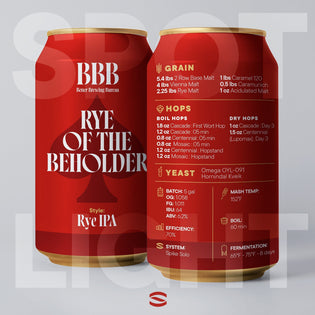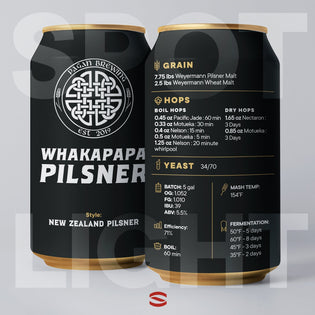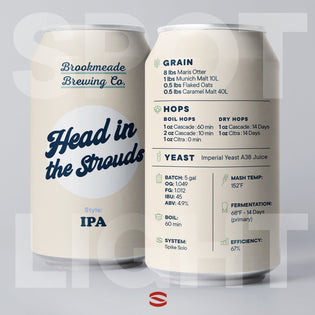
The Brewer: Hopkinsville Brewing Company
Hopkinsville Brewing Company is the first and only craft beer brewery in the city's and county's history. We're a veteran owned and operated, locally sourced, and community-oriented craft beer nano-brewery. We put the hops in Hoptown.
The Beer: Munich Dunkel
Mash Notes: Simple single infusion mash for use with most modern well modified grains (about 95% of the time)
Volumes of CO2: 2.3
The Munich malt produces robust malt characteristics, full body, amber color, and smooth mouthfeel. The flavor is strongly malty and the rich aroma has notes of light caramel, honey, and bread. The chocolate malt may impart rich roasted aroma, notes of espresso coffee, black pepper, and/or toasted nuts.

The Recipe: EKSMD (Experimental Kitchen Sink Munich Dunkel)

INGREDIENTS
GRAIN
- 38 lbs Munich Malt (9.0 SRM)
- 17 lbs 5.7 oz White Wheat Malt (2.4 SRM)
- 1 lb 11.7 oz Chocolate Malt (350 SRM)
HOPS
- Boil hops: 4.46 oz Liberty (4.3%) - 0:60 min
YEAST
- SafLager 34/70 - 6.4 packages

INSTRUCTIONS
BATCH SIZE: 1 BBL
OG: 1.05
FG: 1.01
IBU: 18.5
ABV: 4.7%
EFFICIENCY: 75%
MASH TEMP: 150ºF
BOIL: 60 min
FERMENTATION: 54ºF - 30 days
SYSTEM: Nano
Cheers,
Hopkinsville Brewing Company
Spike Summarizes: All Things Dunkel
What Is a Dunkel?
Dunkel, a German term for "dark," is a traditional style of lager beer known for its rich and malty flavor profile. This style originates from Germany and is characterized by its deep amber to dark brown color. Dunkel lagers offer a delightful combination of malt sweetness, balanced bitterness, and a clean finish, making them a favorite among those who appreciate a well-crafted, malt-forward beer.
What distinguishes Dunkel from other beers?
Dunkel stands out from other beers primarily due to its focus on malt-driven flavors. While many beers may highlight hops or other adjuncts, Dunkel's emphasis on a variety of malt types creates its distinctive taste. The color, ranging from amber to dark brown, is also a key feature that sets Dunkel apart visually.
What's the history of Dunkel beer?
The history of Dunkel beer dates back to the Bavarian region of Germany. Before the widespread use of pale malts, beers were often darker due to the kilning process of the malt. Dunkel emerged as a popular style due to the availability of darker malts. Over time, brewing techniques evolved, and while lighter beers gained prominence, Dunkel maintained its place in German beer culture. Today, Dunkel is cherished both for its historical significance and its timeless appeal.
What does Dunkel taste like?
Dunkel beers offer a complex yet balanced flavor profile. They are known for their prominent maltiness, which can range from bready and toasted to caramel and chocolate-like notes. This malt-forward character is complemented by a restrained hop bitterness that prevents the beer from becoming overly sweet. The result is a harmonious interplay of malt sweetness and subtle bitterness, creating a smooth and satisfying taste experience.
How is Dunkel beer made?
The brewing process for Dunkel beer involves several key steps, including mashing, boiling, fermenting, and aging. The use of a variety of malt types, including Munich and Vienna malts, contributes to Dunkel's deep color and complex malt flavors. Hops are added during the boil to provide balance and a mild bitterness. Yeast strains used in the fermentation process play a role in shaping the beer's final taste. After fermentation, Dunkel lagers are typically cold-conditioned for a period, allowing the flavors to mature and the beer to achieve optimal clarity.
What are the essential ingredients in Dunkel?
The essential ingredients in Dunkel beer include malted barley, hops, water, and yeast. Munich and Vienna malts are often used to achieve the desired color and malt-forward flavor. These malts provide the beer's signature caramel, toasty, and biscuity notes. Noble hop varieties are employed to provide a subtle bitterness and aroma without overpowering the malt characteristics. The choice of yeast strain, usually a lager yeast, contributes to the beer's clean and crisp fermentation.
What foods go best with Dunkel?
Dunkel's malt-driven profile makes it an excellent accompaniment to a variety of hearty and flavorful foods. Its combination of malt sweetness and moderate bitterness pairs well with dishes that have caramelized or roasted flavors. Rich meats such as roasted pork, sausages, and grilled steak complement Dunkel's maltiness. Additionally, Dunkel's versatility extends to earthy dishes like mushroom risotto and aged cheeses.
Is Dunkel a year-round beer?
Yes, Dunkel can be enjoyed year-round. While its malt-forward character might evoke thoughts of cooler weather, its balanced and approachable flavor profile makes it a versatile choice in any season. Whether you're sipping it on a warm summer evening or savoring its comforting qualities during the colder months, Dunkel offers a delightful experience.
How strong is a typical Dunkel?
Dunkel lagers typically have a moderate alcohol by volume (ABV) ranging from 4.5% to 5.6%. This moderate strength allows for the malt flavors to shine without being overwhelmed by alcohol heat. Dunkel's focus is on its malt complexity and balance rather than high alcohol content.
Are there different types of Dunkel beers?
Yes, there are different variations of Dunkel beers, each with its own unique characteristics. The two main substyles are Munich Dunkel and Schwarzbier. Munich Dunkel emphasizes maltiness with notes of bread, caramel, and toffee. Schwarzbier, also known as "black beer," has darker roasted malt flavors that can include hints of chocolate and coffee, similar to a porter or stout.
What's the correct temperature for serving Dunkel?
Dunkel is best served at a slightly cooler temperature than many other lagers. It's recommended to serve Dunkel at around 45-50°F (7-10°C). This temperature range allows the malt flavors to shine while maintaining a refreshing quality.
What are some popular brands of Dunkel beer?
Several breweries produce exceptional Dunkel beers that exemplify the style's characteristics. Some well-regarded examples include:
- Ayinger Altbairisch Dunkel: A traditional Munich Dunkel with a rich malt profile and hints of chocolate and caramel.
- Paulaner Original Munich Dunkel: A classic representation of the style with a balance of malt sweetness and subtle hop bitterness.
- Köstritzer Schwarzbier: A renowned example of Schwarzbier, offering roasted malt flavors with a smooth finish.
These are just a few examples of the many Dunkel beers available in the market.
Why does Dunkel have a dark color?
The dark color of Dunkel beer is a result of the malt used in its brewing process. Dunkel's malt bill includes darker malts like Munich and Vienna malts, which undergo a kilning process that imparts color and flavor to the beer. These malts contribute to the amber to dark brown hues that are characteristic of Dunkel lagers.
How does the brewing process affect Dunkel's flavor?
The brewing process plays a crucial role in shaping Dunkel's flavor. The use of Munich and Vienna malts, known for their rich and toasty character, imparts the beer's signature maltiness. The balance between malt sweetness and hop bitterness is achieved during the boil, with hops providing a counterpoint to the malt-forward profile. The fermentation and aging process allows the flavors to meld and mature, resulting in a well-rounded and flavorful beer.
Is Dunkel beer more bitter than other beers?
Dunkel beer is not known for its bitterness. While it does contain hops to provide a balanced flavor profile, the emphasis is on the malt flavors. The hop bitterness in Dunkel is generally moderate, contributing to a harmonious interplay between malt sweetness and bitterness.
Why is Dunkel often served in a specific type of glass?
Dunkel is often served in a traditional German mug or stein, known as a "Mass" or "Maß." This type of glassware has a wide body and a handle, allowing for a generous pour of beer while keeping the drinker's hand away from the vessel's contents. The wider opening also allows the aromas of the beer to be appreciated while drinking.
Is Dunkel beer good for beginners?
Yes, Dunkel beer can be a great choice for beginners. Its malt-forward flavors are approachable and not overly bitter, making it a pleasant introduction to darker beer styles. Dunkel's balance of sweetness and mild bitterness is likely to appeal to a wide range of palates.
Where can I buy the best Dunkel beers?
You can find Dunkel beers at various craft beer shops, liquor stores, and specialty supermarkets. Many breweries, especially those with a focus on traditional European styles, produce Dunkel as part of their lineup. Exploring local breweries, craft beer establishments, and online retailers can help you discover a variety of Dunkel beers to enjoy.





